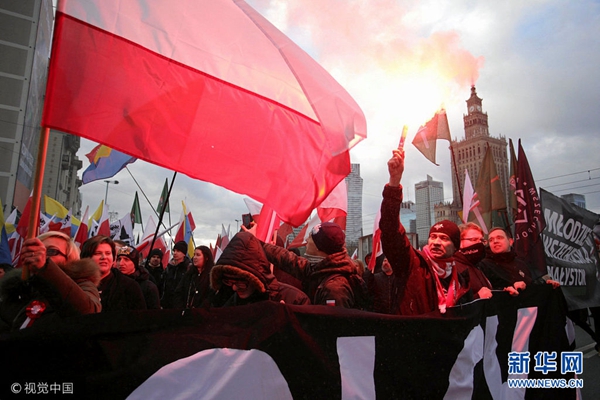Rise of far right in central Europe is a cause of concern
- By Sumantra Maitra
 0 Comment(s)
0 Comment(s) Print
Print E-mail China.org.cn, November 20, 2017
E-mail China.org.cn, November 20, 2017
 |
|
Tens of thousands of nationalists march through Warsaw on Nov. 11, 2017, to mark Polish Independence Day. [Xinhua] |
There are some justifications for nationalist marches, and then there is pure far right fanaticism.
Recently tens of thousands of nationalists marched through Warsaw to mark Polish Independence Day. The majority were normal people, who came out as families even with their babies. However, a significant minority were white nationalists who hijacked the peaceful march, with red smoke bombs, torches, and banners with slogans expressing ideas of a Europe based on pure blood and a white identity.
Police estimated that, overall, 60,000 people took part in the event, which experts said was the biggest turnout in recent history. Of course, not everyone was far right in their political persuasion; indeed, the majority were not.
Nevertheless, there was still some cause for concern. The common anti-refugee sentiments were evident, alongside the more traditional anti-Semitic slogans.
The date of November 11 marks Poland's freedom from imperial rule in 1918 (previously being split between the Austro-Hungarian, German and Russian empires). That freedom was never celebrated given Poland's troublesome history, first under the Nazis and then as a member of the Soviet bloc.
This march is a relatively new concept, started in 2009. It was initially organized by various groups in Poland to show national solidarity, but, under the new government slowly began to take on a more nationalistic character, eventually becoming a rallying point for far-right groups of different persuasions.
Nick Lowles, from the British NGO "Hope Not Hate," was quoted by the Guardianas saying that, "The numbers attending this year seem to be bigger and, while not everyone on the march is a far-right activist or fascist, it is undoubtedly becoming more significant and as a magnet for far-right groups around the world."
The most disturbing aspect of the march was the invitation of noted far-right activists from all over Europe, among them the former English Defence League leader Tommy Robinson and Italian Roberto Fiore.
Poland’s government under the Law and Justice (PiS) party supported it as a "great march of patriots," and in its broadcasts described the event as one that drew mostly ordinary Poles expressing their love of Poland, and not extremists.
"It was a beautiful sight," the Interior Minister said on state TV. “We are proud that so many Poles have decided to take part in a celebration connected to the Independence Day holiday."
This is the crux of the problem, and it goes beyond the factor of a tiny minority of far-right elements, who are hijacking traditional movements all over Europe. The normalization of toxic elements in society by myopic politicians is something Europe shouldn't tolerate and cannot afford.
Not everyone in that march was a Nazi. However, the fact remains that it was organized by certain groups with far-right ties, and it was supported by state media and government ministers. The racist and right wingers are carefully trying to blur the lines and normalize their ideas, and that itself is a cause of concern.
They know full well that international media would willfully conflate this incident, and create the impression that everyone involved was a fascist, which is just the sort of publicity these groups need to expand their mass base.
Finally, the most important thing this demonstration displays is how divided Europe has become. Already, according to latest reports, the German military is planning contingency plans for the EU collapsing like the Soviet Union.
Frankly, political scientists and scholars don't like deterministic predictions, but it is hard to see how, in the long run, these two completely opposing centrifugal force can coexist in an institution now assuming the shape of an empire.
I don't know in which direction it will go, whether the EU will take on an imperial character and destroy all nationalistic forces within its borders, or the latter will tear it apart. One only has to look at European history since the early 20th century to be concerned.
Sumantra Maitra is a columnist with China.org.cn. For more information please visit:
http://m.formacion-profesional-a-distancia.com/opinion/SumantraMaitra.htm
Opinion articles reflect the views of their authors only, not necessarily those of China.org.cn.





